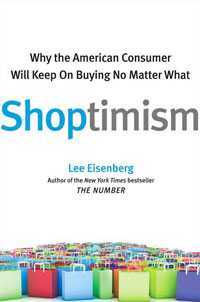Shop 'Til You Bop

My temptation to refer to Lee Eisenberg’s (The Number) career as “storied” was tempered by a sudden echo of George Orwell’s famous “Politics and the English Language,” in which he proscribed, “Never use a metaphor, simile, or other figure of speech which you are used to seeing in print.”
At any rate he was editor-in-chief of Esquire, was one of the founders of Chris Whittle’s dubious Edison Project, worked at Time Inc., and was for a time creative director at Lands’ End. All of which, I gather qualifies him to pen (sorry, George) Shoptimism (Free Press), “an entertaining guided tour through the parallel worlds of selling and buying.”
OK, it’s a smart book with lots of nifty information that purports to straddle a microscopic line between anti-consumerism and shopping enthusiast with the currently fashionable citations and references to neuroscience and social networking. Of course, a defense of shopping that argues it’s a form of self- expression (so is arson and any number of felonies)—blah, blah, blah—is, to me, unconvincing and, well, silly.
But as you might have guessed, I am mightily vexed by the decline of civilization that I attribute to consumerism. I prefer my commentators on the matter to take a more skeptical view:
No ordinary person could ever have withstood such a colonization of human consciousness as the American people have seen. Consciousness being simply awareness, there was no surviving the onslaught. The tsunami of false possibilities and pseudo choices constituted entire constellations in the psyche, of goods, and images of goods large and small: hair dryers, iPods, anti-bacterial wipes, cable television, ammunition, plastic siding, gourmet foods, this HP notebook computer in my lap, the Prius and the Porsche, even words such as Google, Microsoft, China Mobile, Vodafone, Marlboro… They all have psychological and social meaning in our commoditized consciousness, that battlefield where each commodity vies for preeminence with every other commodity in the shifting exposition of stuff we are permitted to labor to pay for.
Amen.
